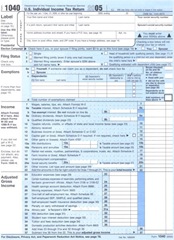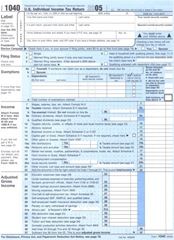The Wall Street Journal has been running a series modestly entitled "The New Rules of Personal Finance". The most recent installment is on what to do differently now that you know that taxes will be going up.
As readers of this blog know, I’m not all that convinced taxes are on the way up anytime soon. Yes, the deficit and debt are heart-poundingly frighteningly large. And yes, any reasonable observer can see that something has to be done. That doesn’t mean it will be.
I am sure that the Administration and its supporters would, if they had their druthers, raise taxes significantly to get the deficit under control. But I am also sure they are aware enough to see that they just don’t have the political capital right now. And when would they? Next year, during the mid-term election season? In 2011 and 2012, when Obama will be facing what is looking like a tough reelection?
Read more »
This blog is primarily about bad advice, that is, the recommendation of unwise money choices. But I also have a nice sideline going in misinformation, statements about personal finance that are not merely foolish, but are flat-out objectively wrong.
A recurring topic in that area, you might call it a running gag, is the lack of tax saving advantages of Roth IRAs over  traditional ones. When I started this blog a few months ago I assumed that most of the people who published misinformation about Roths knew better but had some motive, be it sinister or well-meaning, to mislead. Now I understand that they just don’t understand what they are talking about.
traditional ones. When I started this blog a few months ago I assumed that most of the people who published misinformation about Roths knew better but had some motive, be it sinister or well-meaning, to mislead. Now I understand that they just don’t understand what they are talking about.
The latest infuriating instance of this is a blog post on Mint.com written by Michael B. Rubin, author of the book and blog Beyond Paycheck to Paycheck and "President of Total Candor, a financial planning education company." It was linked to by the Wall Street Journal’s Wallet blog.
Read more »
Regular readers of Bad Money Advice will not be surprised to hear that I prefer numbers to words. (Allegations that I prefer computers to people, however, are greatly exaggerated.) I think this is a natural inclination. Any halfway thoughtful  person favors evidence over feeling, and numbers have the appearance of being hard facts.
person favors evidence over feeling, and numbers have the appearance of being hard facts.
But not all published numbers are factual, even when widely repeated in respectable places. Which presents a difficulty for us lovers of digits. How can we separate the real from the realish? Not to worry, because today I am revealing for the first time my Law of Numerical Fiction which will help identify the imposters.
To be successful, that is, repeated widely as if it were true, a fake number must satisfy three criteria.
Read more »
Last Thursday I ran a post that discussed the grim state of the credit card business. In it I discussed a New York Times article about consumers settling their credit card debt for less than what was owed. I even passed along some simple negotiating tips.
 One thing I (and the Times) failed to mention is that if you settle your $3000 credit card debt for $2000, the $1000 that was written off by the credit card company is often considered taxable income. You will get a 1099 on it and come next April 15 you will either have to pay taxes on it or file a special form to explain why you don’t have to pay taxes on it. (This is discussed in detail in a great post at Don’t Mess With Taxes inspired by the same Times article.)
One thing I (and the Times) failed to mention is that if you settle your $3000 credit card debt for $2000, the $1000 that was written off by the credit card company is often considered taxable income. You will get a 1099 on it and come next April 15 you will either have to pay taxes on it or file a special form to explain why you don’t have to pay taxes on it. (This is discussed in detail in a great post at Don’t Mess With Taxes inspired by the same Times article.)
That it may be taxable doesn’t quite seem fair, does it? You’re broke, you manage to convince the card company to be "reasonable" and then Uncle Sam wants a cut. Actually, it’s not completely nuts. You really are up $1000. You got $3000 of stuff (and interest payments) for $2000. And the $1000 reduces the card company’s taxable income, so it seems mildly reasonable it might increase yours.
Read more »
The other day in my post on Marotta Asset Management’s posts on Free Money Finance I mentioned a maneuver that could make a person some money that involves converting from traditional to Roth IRAs. It’s a fairly obscure strategy. Google and I were only able to find one other explanation of it, in  an article in the Journal of Retirement Planning from 2007. (See page 57.)
an article in the Journal of Retirement Planning from 2007. (See page 57.)
So Marotta may deserve credit for introducing this trick to the blogosphere. Of course, last week I said that I thought that Marotta didn’t explain it very well. It seems only sporting that I try explaining it myself. In case it needs to be made clear, I am neither a CPA nor a lawyer, just a sneaky jerk who likes to do things that make him feel clever.
First, a few preliminaries. Traditional IRAs can be converted into Roth IRAs, but a person has to pay tax on the balance that was in the traditional on the day of conversion as if it was income earned in that year. Currently there is an eligibility limit based on income to be allowed to convert, but that limit goes away in 2010.
Read more »




